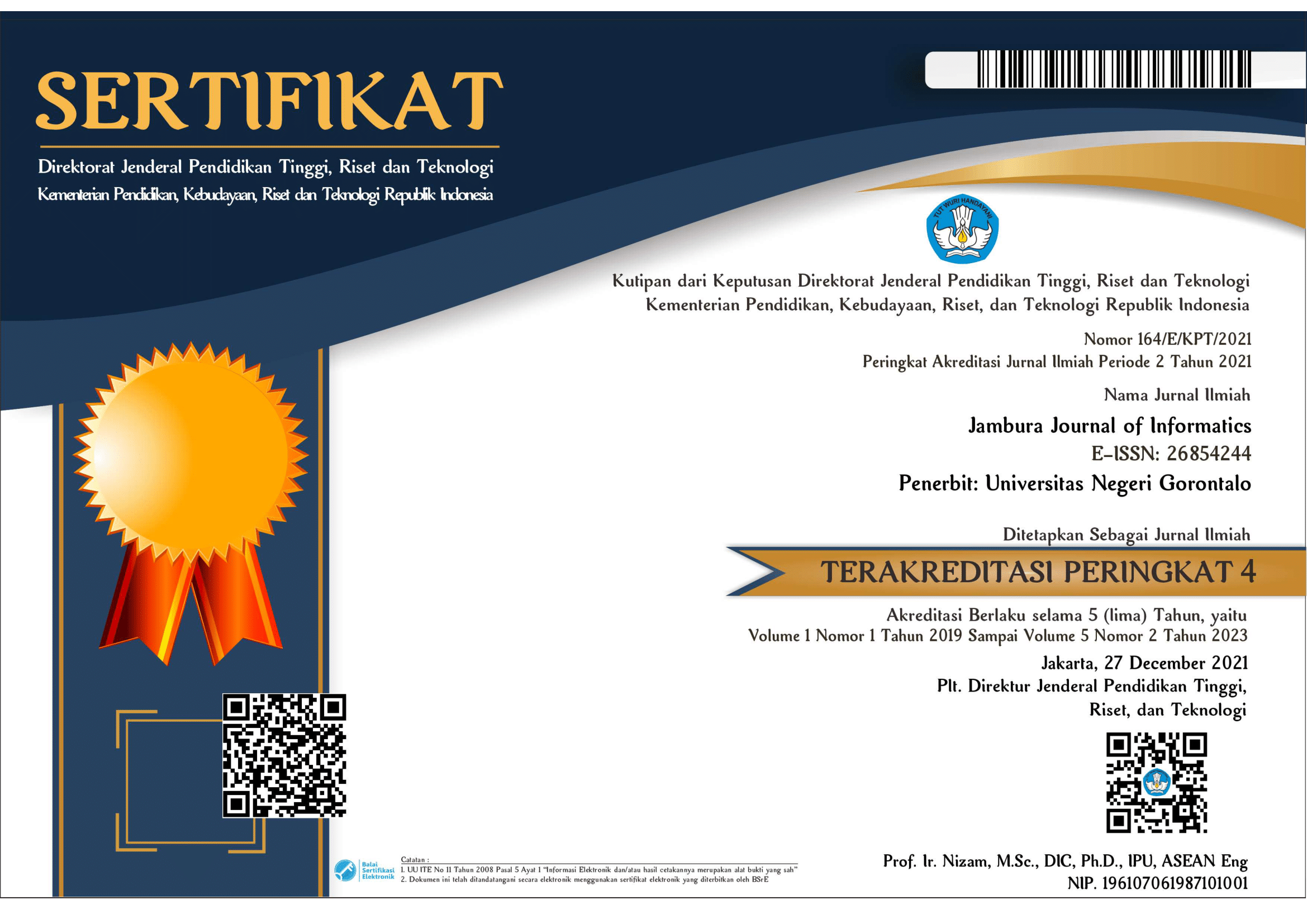Clash-of-Clans API untuk Pengelolaan Klan
Abstract
Many factors influenced game success, including the player's participation in developing the game. Player involvement can be facilitated by providing Application Programming Interface (API) so that players can use it to reach their objectives, this strategy is used by Clash-of-Clans (COC) developer. There are two main problems in the COC game clan management: there are no indicators of player activity, and there is also no good clan war strategy. This research uses prototyping software design and development methods to explore the use of COC API services to overcome these problems. The results showed that the COC API service was able to support the development of clan management applications, succeeded in increasing player activity (in total online time for all players), and the proposed war strategy algorithm was proven to increase war results (by 12%).
Keywords
Full Text:
PDF (Bahasa Indonesia)References
Alanur, S. N., Jamaludin, & Imran. (2016). Permainan tradisional nogarata to kaili sebagai media pendidikan Pkn dalam membangun nilai karakter kewarganegaraan siswa SMP Negeri 13 Palu. EDU CIVIC, 4(1), 1–10.
Aruan, R. S., & Mulyani, H. (2018). Penerapan intelegensia buatan dengan algoritma Negamax pada aplikasi permainan deret lima. Jurnal Bangkit Indonesia, 7(1), 1–13.
Damayanti, A. M. (2015). Pengaruh game online Clash-of-Clans terhadap perubahan perilaku komunitas COC arek bungkul. Tesis. Sekolah Tinggi Ilmu Komunikasi Surabaya.
Dinata, O. (2017). Hubungan kecanduan game online Clash-of-Clans terhadap perilaku sosial (studi kasus game online Clash-of-Clans pada mahasiswa sosiologi Fakultas Ilmu Sosial dan Politik Universitas Riau). JOM Fisip, 4(2), 1–15.
Djawa, Y. A. (2018). Analysis of the jargons used by players of the Clash-of-Clans game , an online game. Academic Journal of Education Sciences, 1(1), 28–39. https://doi.org/10.22341/ajes.000101p028
Fahmi, N. E., Syarief, A., & Grahita, B. (2018). Identifikasi pengalaman bermain game mobile (studi kasus game Clash-of-Clans). Jurnal Sosioteknologi, 17(2), 246–260. https://doi.org/10.5614/sostek.itbj.2018.17.2.7
Makkarumpa, A. R. (2016). Pola interaksi antar anggota dalam game online Clash-of-Clans (studi kasus 4 clan Clash-of-Clans) (Thesis). Universitas Hasanuddin.
Malik, R., & Hidayah, N. (2017). Solidaritas virtual antar member game Clash-of-Clans di clan soloken5. Jurnal Pendidikan Sosiologi, 1–20.
Meliani, M. (2017). Analisis jual beli akun game online Clash-of-Clans dalam perspektif hukum Islam dan hukum positif. Tesis. Universitas Islam Negeri Raden Intan Lampung.
Mortensen, S. T., Nygaard, K. K., & Madsen, O. (2019). Outline of an Industry 4.0 Awareness Game. Procedia Manufacturing, 31, 309–315. https://doi.org/10.1016/j.promfg.2019.03.049
Nicholas, D., Constantinides, P., & Nandhakumar, J. (2015). How to motivate & engage generation “Clash-of-Clans” at work? Emergent Properties of business gamification elements in the digital economy. In Proceedings of the International Gamification for Business Conference (IGBC15), 13, 1576–1580.
Preist, C., & Jones, R. (2015). The use of games as extrinsic motivation in education. Conference on Human Factors in Computing Systems - Proceedings, 3735–3738. https://doi.org/10.1145/2702123.2702282
Rajanen, M., & Nissinen, J. (2015). A survey of game usability practices in Northern European game companies. IRIS: Selected Papers of the Information Systems Research Seminar in Scandinavia, (6).
Reis, S., Reis, L. P., & Lau, N. (2019). Player engagement enhancement with video games. In Advances in Intelligent Systems and Computing, 931, 263–272. https://doi.org/10.1007/978-3-030-16184-2_26
Saputra, R. (2016). Hubungan kecanduan game online Clash-of-Clans terhadap prestasi akademik mahasiswa ilmu komunikasi Fakultas Ilmu Sosial dan Politik Universitas Riau. Ilmu Administrasi Bisnis FISIP Universitas Riau, 3(2), 1–9.
Saputra, R. (2016). Efek game online terhadap kreatifitas berpikir anak di Kelurahan Kadia Kecamatan Kadia Kota Kendari. Journal Ilmu Komunikasi UHO, 1(3), 1–16.
Syarif, A. S., Aprianti, R. E., & M, U. H. (2011). Pengaruh turn-based strategy game terhadap kemampuan manajemen organisasi pada mahasiswa Fakultas Psikologi Universitas Negeri Makassar. Jurnal Nalar Pendidikan, 5(1), 80–85.
Veronika, U., Arianti, A., Nurnaningsih, & Astuti, P. (2018). Learning English vocabulary through online games: case study of students in 4th grade of state elementary school (SDN) Jombor 01, Sukoharjo, Central Java, Indonesia. International Journal of Multicultural and Multireligious Understanding, 5(4), 470. https://doi.org/10.18415/ijmmu.v5i4.433
Vervoort, J. M. (2019). New frontiers in futures games: leveraging game sector developments. Futures, 105, 174–186. https://doi.org/10.1016/j.futures.2018.10.005
Yuliastutik, I. (2016). Pendapat MUI Kota Malang terhadap jual beli account Clash-of-Clans (COC). Central Library of Maulana Malik Ibrahim Islamic University of Malang. https://doi.org/10.3929/ethz-b-000238666
DOI: https://doi.org/10.37905/jji.v1i2.2720
Refbacks
- There are currently no refbacks.
JJI has been indexed by:

| 
| 
| 
|

| 
| 
| 
|

|
| Editorial Office |
Engineering Faculty Building, 1st Floor Jl. Prof. Dr. Ing. B. J. Habibie, Bone Bolango, Gorontalo, 96119, Indonesia.Whatsapp: +6281314270499Email: jji.ft@ung.ac.id |
 |












